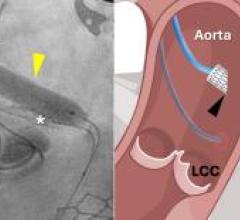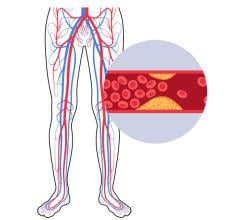September 2, 2008 - Data from the landmark SYNTAX trial indicates patients with very complex coronary artery disease can safely choose to be treated with angioplasty and drug-eluting stents rather than open-heart surgery, said the Society for Cardiovascular Angiography and Interventions (SCAI).
The one-year results of SYNTAX also show that most patients with left main and multi-vessel disease who undergo angioplasty and stenting will not need a second revascularization procedure in the first year.
Until this week’s announcement at the European Society of Cardiology Congress in Munich, Germany, patients with advanced and anatomically complex coronary artery disease were advised to undergo open-heart bypass surgery. The SYNTAX (SYNergy Between Percutaneous Coronary Intervention with TAXUS and Cardiac Surgery) study found the less-invasive option of percutaneous coronary intervention (PCI) with drug-eluting stents had rates of heart attack and death no different from bypass surgery after one year.
“Starting today, I can tell my patients with left main and multi-vessel disease that angioplasty and drug-eluting stents are just as safe for them as surgery in terms of death or heart attack,” said Dr. Ted Feldman, SCAI past-president, professor of medicine at Northwestern University School of Medicine, director of the cardiac catheterization laboratory at Evanston Hospital near Chicago, and SYNTAX Steering Committee member. “The SYNTAX results are good news for patients and physicians because we now have another treatment option for the most complex patients. PCI is less invasive than surgery, and it takes days, not weeks, to recover from.”
The SYNTAX study is the first randomized comparison of PCI with drug-eluting stents vs. bypass surgery in patients with the most complex coronary artery disease - left main stenosis and three-vessel disease. The study revealed findings for the primary endpoint, focusing on the safety and effectiveness of the two therapies and whether either group experienced more heart attack, stroke, or death, or was more likely to require repeat revascularization procedures (either a second PCI or bypass surgery) by the end of the first year.
In its head-to-head comparison of PCI vs. bypass surgery, SYNTAX found no statistically significant difference in risk of death (4.3 vs. 3.5 percent) or heart attack (4.8 vs. 3.2 percent). The risk of stroke was significantly greater for bypass surgery (0.6 percent for PCI vs. 2.2 percent for bypass). Taken together as a composite, these three data points (death, heart attack, and stroke) show that PCI and bypass surgery stack up overall as equally safe options for patients with left main and multi-vessel coronary artery disease.
Less than 8 percent more PCI than bypass patients underwent either a second angioplasty procedure or bypass surgery by the end of the year following their procedure.
“Historically speaking, this is remarkable,” said Dr. Feldman. “It means that more than 85 percent of patients can choose the less-invasive angioplasty/stenting option and won’t need another procedure a year later. On the revascularization question, we’ve never seen such a small difference between PCI and bypass surgery, even in less complex patients.”
SCAI urges all patients and their physicians to consider the broad spectrum of care for treatment of cardiovascular disease, stressing that no single therapy is best for every patient.
For more information: www.scai.org, www.seconds-count.org.


 January 15, 2026
January 15, 2026 









